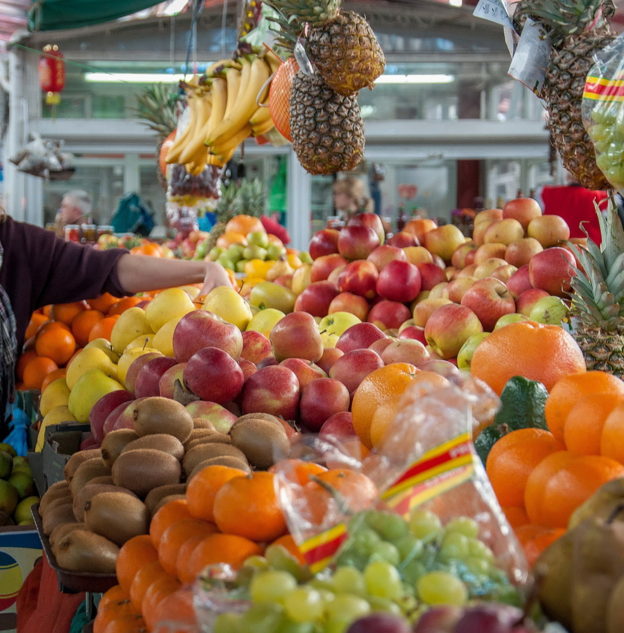By David Blyweiss, M.D., Advanced Natural Wellness
August 9, 2021
When it comes to ripening avocados, mangos or bananas, you’ve probably heard of the old “put them in a brown paper bag” trick. Just place the fruit in a brown paper bag and fold the top down. Then, depending on their current ripeness, they’ll fully ripen in just three to four days. I do it this all the time.
But when I want one of these fruits to ripen even faster, I add an apple to the bag. This speeds up the ripening process by a day or two. So I can have my guacamole on Friday night instead of Sunday morning.
There’s a reason why these ripening tricks work. It’s called ethylene, a natural ripening gas. All fruits produce it, some more than others.
When you put an ethylene producing fruit in a brown bag, it traps the ethylene around the fruit to help it ripen more quickly and evenly.
Open your arteries, improve blood flow for a new health miracle...
Did you know your circulatory system has over 60,000 miles of arteries, veins and other blood vessels, if stretched end to end?
But as you age, your blood vessels undergo changes, which may cause them to stiffen, thicken and get clogged.
GOOD NEWS! Doctors have now identified a “Miracle Molecule” inside your arteries that helps OPEN your arteries and IMPROVE blood flow.
It’s what Dr. Valentin Fuster calls it, "One of the most important discoveries in the history of cardiovascular medicine."To you, that means...
- Healthy blood pressure
- Sharper mind and memory
- Skyrocketing energy and muscular strength
- Increased pleasure and passion in the bedroom
- Improved circulation to every cell and organ in your body
Go here to discover a new natural way to significantly boost the levels of this miracle molecule in YOUR body NOW!
If you place another ethylene producing fruit in the bag with it, it increases the amount of ethylene trapped in the bag so it ripens even faster. (Just make sure to check the bag every day to make sure the fruit doesn’t get too ripe.)
And by the way, when you use an apple to ripen other fruit, go for red delicious or golden delicious apples. Apparently the newer varieties, like Gala or Fuji, have been bred to produce less ethylene so they stay crisp longer.
While ethylene is great when you want to ripen something quickly, it does have a downside.
When you place ethylene producing fruits next to produce that is sensitive to ethylene, it can make the other produce spoil faster.
So if you store your apples next to your broccoli, the broccoli will start yellowing faster. Put your kiwis in the same bin as your cucumbers, the cucumbers are going to get soft and moldy more quickly.
The World's Quickest Solution for Ending Prostate and Urinary Misery
This has recently been revealed to be one of the only real breakthroughs in prostate health.
The seeds of a strange fruit (sometimes called "Chinese Apples") hold powerful phytonutrients that are a revolution in prostate health.
In fact, UCLA and Veterans Administration research have now proved this to be true.
Not only that, but it may be the worlds quickest solution for ending prostate misery.
Simply stated, these phytonutrients represent a huge step beyond beta sitosterol, saw palmetto, and other phytosterols alone.
Simply click HERE if you want to have fast prostate relief...restful, uninterrupted sleep...no more constant "urges to go"...enhanced virility...and optimal prostate support for life.
Some of the biggest ethylene producers are apples, apricot, ripe avocado, ripe kiwi, nectarines, ripe bananas, cantaloupe, mangos, honeydew and ripe tomatoes.
Produce that is sensitive to ethylene gas includes asparagus, broccoli, brussels sprouts, carrots, cauliflower, cucumber, lettuce and squash.
These foods don’t play well together. So you never want to store the ethylene producers and ethylene sensitive produce next to each other, whether on the counter or in the refrigerator. Otherwise, you’ll speed up decay in the ethylene sensitive produce.
How to Store Ethylene Super Producers
When dealing with ethylene producing produce, there are some things you can do to keep them fresh longer.
- The riper an ethylene producing fruit or vegetable is, the more gas it produces, which makes it ripen even more quickly. That’s why an avocado can be just perfect one day, and practically go bad overnight. The best way to stop ethylene super producers from over ripening is to put them in the fridge when they are ripe, or real close to it.
- Celery generally comes in plastic bags that traps the ethylene inside. This is one of the reasons it tends to wilt and yellow so quickly. To make it last longer, wrap it in aluminum foil and keep it stored in the crisper drawer.
- Do your bananas get mushy too fast? You can store them on a banana hook, where there is plenty of circulation to carry the ethylene away. Or you can wrap the stems, where the ethylene is released from, in plastic wrap.
- Cucumbers are extremely sensitive to ethylene gas, and they hate the cold. So store them at room temperature away from ethylene emitting produce.
More Hacks to Keep Your Fruits and Veggies Fresh
It’s disappointing when you go to make dinner and find that your mushrooms are slimy, your lettuce is limp and or your fresh herbs have gone soggy. Sometimes, it’s just a matter of how you store them.
Mushrooms generally come in those Styrofoam containers covered in plastic wrap. Or if you buy them loose, maybe you put them in a baggie when you bring them home.
Well, that plastic traps in moisture, even when it has a few perforations in it. Plus, the mushrooms themselves generate moisture. So your mushrooms get slimy and mottled. But if you move them to a paper bag when you bring them home, it will absorb any excess moisture for fresh, slime-free shrooms.
Limp lettuce is another unsatisfying experience. It loses water as the air circulates around it, which makes it limp and wilted. You can keep lettuce and other leafy vegetables fresh longer by washing them when you bring them home. Then, dry them as best you can, wrap them in a paper towel, and seal them in a container.
And fresh herbs. They have a tendency to get soggy very quickly. To keep soft, leafy herbs like parsley, basil and cilantro fresh longer, trim the ends and stand them upright in a glass of water in the fridge. The only exception to this is basil. It will turn black in the refrigerator, so it needs to stay on the counter.
If the herbs are woody (sage, oregano, rosemary), loosely wrap them in a slightly damp paper towel and store them in a sealable container.
And guess what I recently discovered?
When you buy a fruit with wax on it, you’re not supposed to wash the wax off until you’re ready to eat it. It’s a natural outer layer that keeps it firm and prevents the fruit from shrinking. Apples, plums, pears and other fruits produce their own natural wax. I didn’t know that, but now I do.







